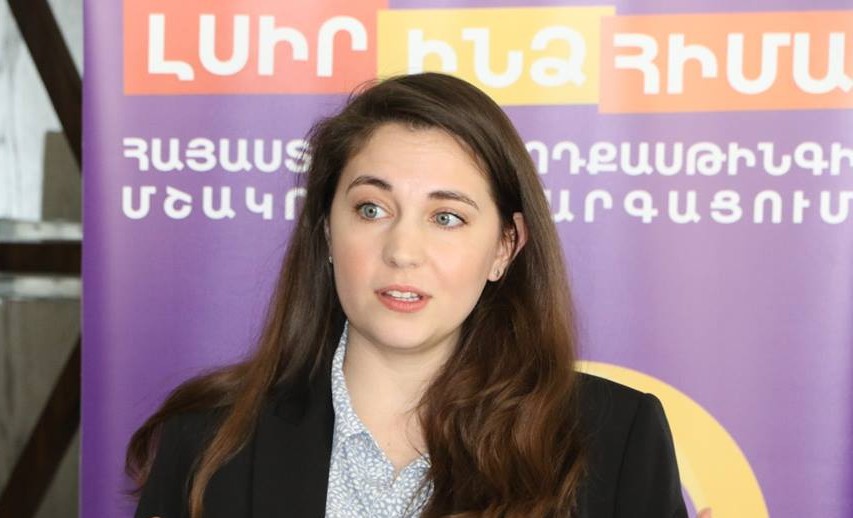
Erika Lantz is a radio producer and has a platform for her own podcast. Her reports have been broadcast by WNYC (New York), WBUR (Boston) public radio companies.
In the podcast, she highlights the voices of people, live conversation, sincerity. The stories help her create strong relationships with people who live in different countries and who have the same interests.
Erika Lantz brings journalism and art to the same dimension and creates stories that are as emotional as music.
Her many stories have won regional and national awards. Recently, at the invitation of the Media Initiatives Center, she conducted the “Hear Me Now” training for beginner podcasts.
The podcast, as a genre, is newly developing in Armenia, and many do not differentiate it from radio programs. Let’s talk about the differences.
You could think of podcasting as just another way to listen to a radio program on demand, any time you like, on your mobile device. There is no need to follow radio programs to find the program in a common newsgroup.
So in that sense, it is more of a technological difference than one in content. That being said, that technological difference ends up affecting the content.
For example, there is no time limit. You can make your podcast five minutes long or you can make it two hours long, you can take some more risks creatively. You don’t have the same gatekeepers who set up standards or the pressure to create content that is liked by everyone, you can focus on more of a niche audience.
It’s also not geographically based. You can have a local podcast, and you can have a podcast that is not geographically focused but focused on an audience based on their interests. You can target an expanded audience, finding and communicating with people who share the same interest from different countries.
Is it easy to talk about complicated topics?
Podcasts, like radio, has challenges. For a radio program, people can tune in halfway through and they have to build up the program in such a way that no matter what point someone joins, the program is interesting.
The second challenge is that the listener can change channels at any time.
The third is that they are likely listening to the radio while doing other activities such as driving, or cooking and so on. In other words, you need to keep their attention, which is also a challenge.
This is all true for podcasts, plus the greater challenge which is getting someone to subscribe and continue to choose you. They have to seek you out and then they have to become a dedicated listener.
I think the beginning of the podcast is extremely important. Try to have something genuinely surprising that will hook the listener in the first 20-30 seconds and keep them in suspense.
I recommend not to start podcasts with a host introduction saying, “Hello, my name is such and such and today we are doing this.”
You should start with the most surprising, most interesting thing and make the episode in such a way that it is constantly raising questions that the audience feels needs to be answered.
I personally work in the genre of narrative journalism. I am working on stories that have a narrative arch with characters who are facing a problem that they are trying to overcome. So for me, suspense means something else in terms of creating that narrative arch. But so many podcasts are more of an interview structure.
I like to think of using sound tell the story and bring it to life and help immerse you into that world even more.
I think it’s one of the powerful things about podcasts. And also it can help with keeping things concise because I can use sounds to tell things instead of using my words to describe something, meaning I can layer more meaning in less time.
How do you encourage people to use this type of media?
I love podcasts first of all because I love sound. I have a music background which probably contributes to this. Hearing people’s voices is really powerful for me, so much is communicated through someone’s tone.
Audio has the power of sparking imagination in the listener. They are picturing the things that you are talking about in their head as opposed to television, where you are watching everything unfold.
Audio is the perfect medium between capturing a lot of things that are real, but also letting the listener imagine things. This turns into a really beautiful collaboration between the listener and the creator of the podcast.
For many podcasters, it takes a lot of creativity, thinking about how to grow audiences and also how to grow each other’s audiences to create that culture of listening to podcasts.
In the US they say rising tides lifts all ships. Cross-promotion of podcasts is important. It is important to work together in collaboration and not think of each other as competitors.
Can journalists make money through podcasts?
Audio also requires a financial investment (hosting, technology) but it is a lot less than what is needed for large video production.
It is hard to say what will work in Armenia, but in the US, if your podcast has a lot of listeners, you become interesting for advertisers. And since successful podcast communities are forming, the model of donation truly works well.
Interview by Gayane Asryan


Add new comment
Comments by Media.am readers become public after moderation. We urge our readers not to leave anonymous comments. It’s always nice to know with whom one is speaking.
We do not publish comments that contain profanities, non-normative lexicon, personal attacks or threats. We do not publish comments that spread hate.